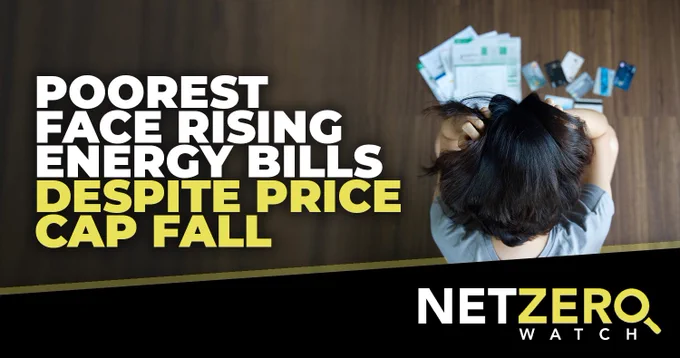Ofgem is to announce the new energy price cap for the October to December period on Friday. Thinktank Resolution Foundation has accused the energy regulator of sanctioning energy companies applying “unfair” prices, warning that more than seven million households will likely face higher energy bills than last winter.
Resolution Foundation revealed that higher standing charges and a loss of government energy bill subsidies will likely penalise households with relatively low consumption. Even though energy bills will fall from £2,100 to £1,925, many households will likely pay more than last year as they will no longer receive the £400 government subsidy. The standing charges will rise to almost £300 compared to the £250 in October 2020. While the network charges are to cover maintenance charges, Ofgem has allowed energy companies to use the money to attract energy customers forced to switch because their provider went out of business.
The standing charges hit poorer and single-occupancy households particularly hard. Former pensions minister Baroness Ros Altmann told The Telegraph:
“The regulator Ofgem has allowed energy firms to increase standing charges to help pay for the cost of failed energy suppliers. This seems to me even more unfair. However much a poor household tries to cook less, bathe less or turn down their heating, they can’t escape the standing charge.”
Ofgem calculates the energy price cap using consumption averages. However, these estimated amounts have come down, leaving those with energy and gas consumption below the 79%-average facing higher charges. Over a third of all households fall into this category, alongside nearly half of the poorest 10,000 households.
Resolution Foundation estimates that 7.2 million households will have higher energy bills this year than last year.
Insisting that the cost of living crisis is far from over, Johnathan Marshall, Resolution Foundation senior economist, told Sky News:
“Although government schemes have improved their targeting of support throughout the crisis to those most in need, significant gaps remain which should be urgently addressed to help the most vulnerable get through the challenging months ahead.
“In the longer term, the government needs to reduce the UK’s dependency on gas and improve the state of our home insulation to prevent the winter energy crisis from becoming an annual occurrence.”
An Ofgem spokesperson told The Telegraph that the energy regulator “continues to review how supplier costs are allocated between standing charges and unit rates.
“We looked long and hard at whether moving the costs from standing charges to usage was the right thing to do, but the numbers just didn’t stack up.
“Moving charges on to the unit rates would be potentially much more damaging for customers such as those with disabilities and the elderly who are unable to reduce their usage. This risks severely disadvantaging some of the most vulnerable people in our society – but we continue to assess possible options.”
Ofgem chief urges the government for urgent support overhaul
According to The Guardian, Ofgem chief executive Jonathan Brearley has called on ministers to question whether the current “very broad and crude” price control is still adequate. Over the last two years, record wholesale energy market prices have pushed 7.5 million households into fuel poverty and put 30 suppliers out of business. Meanwhile, the government was forced to spend almost £80 billion on energy supports.
Brearley has urged the government to create a “more rigorous framework” in support of households:
“It’s important that collectively we understand that a very broad and crude mechanism is going to have risks as well as benefits.”
One way to help families would be to introduce a social energy tariff, a mechanism that has received support from energy suppliers and Whitehall. Set below the supply cost, the tariff could be made available to low-income households.
“We work with government on all options, including a social tariff.
“I think we are clear that a more rigorous framework of providing support for customers is needed. But, in a sense, I accept that the government has a set of dimensions to think about that I don’t have to think about.
“As a regulator, without a doubt, we’ve had a whole lot more to do and a market that was very different from the one we envisaged in 2020.
“But now, as the market stabilises, we need to think hard – with the industry – about what is the right market for the future.”
Meanwhile, on X, National Energy Action tweeted:
Tomorrow morning @ofgem will update the level of the energy price cap. @CornwallInsight estimates the typical annual energy bill is expected to be around £1,925. While this is a slight decrease, our figures show that there will be 6.3 million UK households in #FuelPoverty. pic.twitter.com/FJTBuF9B8z
— National Energy Action (@NEA_UKCharity) August 24, 2023




